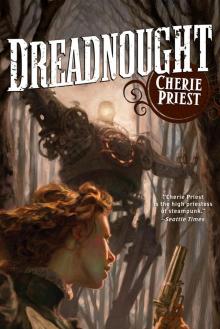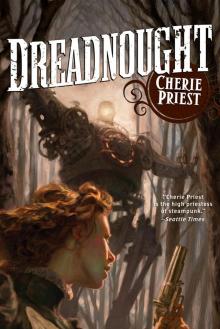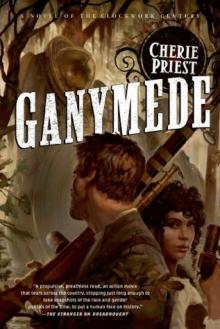- Home
- Cherie Priest
Fathom Page 2
Fathom Read online
Page 2
“He’s a Yankee—and an Italian, to boot,” her mother said with teasing cheer. “Your grandmother thinks they’re all a bunch of crooks.”
“No,” she argued. “Not all of them. But this one in particular, yes. He’s a crook, and a carpetbagger, too.”
Nia’s hands were going sweaty around the bunched letter in its crushed envelope. “I don’t care if he’s so crooked, he’s got to screw his socks on every morning. I want to go. And I’m going to.”
Grandmother spoke around Nia, as if she weren’t there. “Marjorie’s let that girl go native, too. She’s practically a Yankee herself now. She’ll be a terrible influence on yours, I’m telling you. If I were you, I wouldn’t let her go.”
“You can’t make me stay,” Nia insisted.
“I can’t really make her stay,” her mother agreed, talking to Grandmother past Nia’s head, “if she wants to go. We could use the help, but I think we’ll be all right. It might be good for her—getting out of town, doing a little traveling. You used to like traveling, Momma.”
“I’d enjoy it now, if I didn’t have a grove to run. Last time I traveled anywhere was with your daddy, back when that one”—she cocked a thumb at Nia—“was just learning to read. But that’s neither here nor there. I still don’t like Marjorie’s tone in that letter.”
“What’s wrong with her tone?” Nia demanded.
“It’s bribery—that’s what she’s doing,” Grandmother answered. “She’s trying to bribe you with her money, and with the way she lives. She’s tempting you with how you won’t have to work, and you can swim in the ocean like a little heathen if you want, and you can stay in her nice big new house over there . . . like what you’ve got here at home isn’t just as good.”
Nia’s mother shook her head. “I don’t think she means any of it like that.”
“Maybe she don’t. But that’s how it reads to me. Go on down then, if that’s what you want, girl. We’ll get along without you, if you want to spend the season getting picked on and run ragged by that wild girl. She’s older than you, and she’s been around a lot more, and she’s not going to let you forget it. Bernice didn’t write that note, and I promise you she didn’t ask her mother to write it, either.”
Grandmother’s words were still humming in Nia’s ears when she finally arrived on Anna Maria Island, a small strip of sand that jutted into the ocean, south of Tampa.
After a long trip by truck, by train, and by ferry, a servant escorted her to the brand-new house at the edge of the beach. After he left her, she made her way into the courtyard behind the house, where two women were shouting at each other.
Nia poked her head around the wall’s edge and flinched as a plate shattered just a foot or two away from it.
“Hello?” She used the quiet word to announce her presence, and it almost didn’t work; but Marjorie spied her niece and threw up her hands as if someone were pointing a gun at her.
The brunette woman in the tailored white suit smiled spontaneously, and stiffly. “There you are! Welcome, dear. I’m so glad you came. I assume Roger took your things to the cottage. . . . Did you have any trouble finding us?”
“Oh, no,” she said, and she resisted the urge to add that she’d found her way by following the racket. Nia tiptoed into the yard to give her aunt a hug. “Roger’s directions were good. And Bernice, it’s real good to see you again, too,” she said to the sharply dressed, blondly curled beauty with a fistful of expensive porcelain.
“Bernice,” Marjorie said through clenched teeth. “Nia is your guest. Say hello.”
“My guest? I didn’t invite her.”
Marjorie pried the bit of china from her daughter’s hand and set it back on the long covered table before Bernice could throw it. “Yes, I know, but it’s been a long time since you’ve seen each other. Since . . . since your grandfather’s funeral, I think. Or no, we all went to Gasparilla that next year, didn’t we?” The last part came out thoughtful, as she tried to count back the years.
But then she turned to Bernice and her voice dropped. She breathed the next part in an exhausted whine, and underneath it, Nia could almost hear a long-buried accent that sounded like her mother’s. “Just for now, please? Let it go. Take Nia over to the cottage and help her get settled in.”
Bernice liked the begging well enough to release the remaining plates, but even Nia could see that her truce was a temporary arrangement. “Fine,” she said. She relaxed and folded her arms across an expensive ivory suit jacket. “And hello, Nia. So Roger took your things to the cottage already? I’m ever so glad we won’t be forced to carry them in this dreadful heat.”
Nia stepped aside and let Bernice take the lead. “Yes, your father’s assistant took care of it. He met me at the ferry.”
“My stepfather’s assistant.” She casually lifted another glass and smashed it into the wall as she walked past it.
“Aunt Marjorie,” Nia dragged her heels and called over her shoulder, “will you be joining us?”
“No, dear. I’ll stay and finish setting up for the party. Mr. Coyne doesn’t think it’s going to rain tonight, so we can leave everything out in the open. I want it to look nice for tomorrow. And don’t go far, girls. Supper will be ready at eight.”
They left her in her perfectly trimmed garden behind her new house, carefully picking up shards of glass and arranging the surviving cups and cutlery.
Nia wondered how they’d ever have enough settings left for the party; but she knew her aunt had plenty of money, so there was probably more dinnerware waiting wherever the broken plates had come from. It must not be a problem.
She let Bernice lead her out of the courtyard, and together they wandered among the jungle-thick trees back out to the dirt strip that passed for a road.
“Nee-uh,” Bernice said her cousin’s name with an exaggerated snap. “That’s a weird name. I don’t like it. I want to call you something else.”
“Then I guess you don’t expect me to answer.”
Bernice reached into a pocket in her skirt and pulled out a silver cigarette case. “You’re my guest. I’ll call you whatever I want. Nia,” she said again, not calling the name but turning it over in her mouth as if she were trying to tell how it tasted.
“It’s short for Apollonia. Use that, if you’d rather,” Nia suggested. Then she said, “Give me one of those, if you don’t mind.”
“Certainly.”
Nia accepted a skinny white cigarette and let Bernice light it. They stopped together in a patch of shade and puffed together in silence until Bernice spoke again. “Now where exactly are you from?”
Nia checked a nearby tree for large insects and, seeing none, she leaned against it. “Tallahassee.”
“Where’s that?”
“Up north, on the mainland. Up in the panhandle.”
“Is it like this island?”
She thought about it. “Yes and no. We’re in the middle of a forest there, and we’re a long way from the beach. But it’s hot, and the greenery’s the same.”
“But it’s a city, right?”
“A city? It’s barely a town.”
“Hmm.” She acted like she was going to say something else, but instead she twitched her head and swatted madly. “Could you—something’s stuck in my hair!”
Her arms flapped like a wet dog’s ears while Nia held her head steady enough to detangle a buzzing beetle. When it was free, Bernice fluffed and combed her short shiny hair with her fingers.
Nia played with the bug and tried not to act jealous. She’d never had the nerve to cut her own hair short; it was kept off her neck with a limp brown braid. Her mother would have a fit if she ever cut it; and besides, she didn’t have any curls to fluff anyway.
“What is that thing? Will it sting me?”
“It’s just a june bug,” Nia said as it launched off her hand with a hum. “They don’t sting anybody. And they’re not nasty like the palmetto bugs.”
“What are those?”
“
They’re roaches bigger than your thumb. And they fly.”
Bernice shuddered and clutched herself. “I’ve seen big roaches before. We have them all over the place in the city. I just didn’t know they lived anywhere outside. Forget this. Let’s go back to the cottage. The less time I spend outdoors, the better. Then again—” She scowled and changed her mind. “—Antonio’s in there. That son of a bitch.”
“You really don’t like him much, do you?”
“I haven’t got the words.”
They crushed out their cigarettes in the sandy dirt and meandered along a path that alternately widened and tightened to accommodate the trees that no one had yet cut down.
“That’s funny.” Nia dusted her hands off on her skirt. “I thought I heard a bunch of good epithets back there at the courtyard. What was all that about, anyhow?”
She grunted something between a cough and a chuckle. “Epithet,” she said, like she hadn’t heard the rest. “What’s that, a curse word or something?”
“Yeah. A curse word or something.”
“Then just say ‘curse word.’ I thought you came from a farm. You don’t talk like it.”
Nia said, “Sorry I’m not as dumb as you expected,” and she waited for Bernice to change the subject again. Their arrival at the cottage gave her plenty of opportunity.
“This is it,” she announced. “This is where we’ve been staying while the house was getting finished. And that’s Antonio. You don’t have to talk to him if you don’t want to.”
“Hello,” Nia said to the alleged crook, but she couldn’t muster a smile to go with it. He was hidden in the screened area that kept him shadowed and relatively cool, and all she could see was the shape of a man in a hat, holding a drink in his hand.
Bernice reached for one of the handrails that flanked the wooden steps. “On second thought, let’s not go inside. We might as well get a nice view for the smell.”
Antonio nodded passing acknowledgment at Nia and disregarded Bernice with skill born of long practice. Nia mumbled that it was nice to meet him, and he responded in kind, with a similar level of enthusiasm.
He leaned forward to set down his drink, and for a moment his face slipped into a patch of sun. Nia thought he was good-looking, with deep-set eyes, dark-slicked hair, and a strong nose. Or perhaps he only looked handsome because he was well-dressed.
Bernice turned away from the porch and wobbled on tottering high heels back down into the dirt-rut road. Nia quit staring at her uncle and followed her.
“Let’s go out to the dock.” She peeked down at her watch. “It’s almost seven thirty, but we’ll be back in time for supper. It’s not very far.”
Nia had never seen such an expensive watch before, and certainly not on someone her own age. She thought it was pretty, but it looked weird on a half-deserted island.
Bernice reached for her cigarette case again and offered her cousin another before she even asked.
Nia fell into step beside her. “Are you sure we’ll get back in time?”
“I’m sure. You ever been out here before?”
“No.”
“Well, I have, and I’m telling you it isn’t very far. Welcome to the middle of nowhere.” She took a particularly long drag on her cigarette, using the time to think or plot. When she finally spoke, her words were dry and a tiny bit menacing. “There’s going to be a party tomorrow.”
Nia tried not to wonder why the simple statement sounded like a threat. “The courtyard looks nice,” she said. “Your mother did a nice job of putting it together.”
Bernice nodded. “It’s all real nice,” she agreed with a scowl that guaranteed she didn’t mean it. “It’s their anniversary. Mother and Antonio have been married for ten years. Tomorrow will be their first day in their new house, and ten years together. Hoo-ray. At least someone’s happy to be here.” She kicked off her shoes and climbed onto a rickety gray pier, dropping her feet into the water and twirling them around. The hem of her skirt trailed in, too, but if she noticed, she didn’t care.
Nia glanced up at the sky and observed, “We’re on the wrong beach. If we wanted to watch the sun set, we should’ve gone to the other side of the island.”
“It doesn’t matter. We’ve got all summer, and then some.” Bernice stirred the water with her toes while Nia settled down onto the dock beside her and let her own feet dangle. “You know what?” she said. “You smoke like you’ve done it before, not like you’re trying to show me how smooth you are.”
“I’ve smoked before,” Nia admitted. The men who worked the farms smoked on their breaks, and if her mother wasn’t watching, sometimes she’d smoke with them just to taste it. If they were going to treat her like a hired hand, she figured she’d act like one.
The girls sat and smoked while the sun sank behind them.
Nia was about to mention the time again when she saw something strange in the water. At first she dismissed it as a trick of the moonlight, but it seemed to come closer, so she nudged Bernice. “Who’s that?” she asked.
“Where?” Bernice strained and stretched her neck.
“There, did you see her? Someone was . . . swimming.”
Bernice frowned. “I don’t hear any splashing.”
“She’s gone now,” Nia said. “I didn’t hear the splashing either, but I swear, I saw someone. It was a woman with long hair.”
“You’re crazy.” Bernice pulled her feet out of the water and shook them dry. “There’s no one out there this time of night except those big damned fish. What are they called . . . dolphins.”
Nia lifted her own feet out and felt around for her shoes. “Dolphins aren’t fish,” she said.
Bernice was already walking away.
Nia glanced back at the water and saw the mystery woman again. This time, the woman didn’t duck away, but she stayed there, her naked torso rising up out of the water. She was much closer to the pier, only a few yards out in the bay, and Nia could see her more clearly. Her skin was dark, and her hair hung so long that it floated around in the water at her waist.
Somehow, Nia suspected that Bernice would not turn around even if she called out again—so she did not tell her cousin that the woman’s silvery, empty eyes followed them both until they were back in the trees.
At supper, Marjorie seated Nia between Bernice and Antonio, who scowled and spit at each other around her, or through her, if she leaned forward too far. Occasionally, Antonio made a vague stab at conversation; but Bernice would not let the smallest comment go unattacked.
“It’s not so hot tonight, is it? Not as bad as it has been,” Antonio tried.
Bernice laughed sharp and loud. “How would you know, you lazy bastard? You’ve been sitting inside all day on the porch.”
Antonio squeezed his fork and lifted it to his mouth, where he unlocked his jaw long enough to snatch a mouthful of fried plantains. Marjorie stared at her plate and fiddled with her food. Under the table, her thigh lurched.
“Honestly, Mother. If you want to say something, have out with it. There’s no need to get violent. Besides, that’s the table leg you kicked just now, and the last two times you hit Nia in the shins—only she’s too nice to say anything.”
“You could take a lesson from her.” Antonio swallowed his plantains and picked up another forkful.
Marjorie stumbled into the conversation. “Please don’t antagonize her, dear.”
“Yeah, Antonio. Don’t antagonize me.”
“Now you stop it, too,” Marjorie fussed.
“This is my house.” Antonio almost shouted. “I paid for it, and I’ll antagonize anyone inside it if I damn well please.”
“We’re not in your house yet.”
“Sweetheart, please don’t talk that way to your—”
“Shut up, Mother.”
“Don’t tell your mother to shut up!”
Bernice jumped to her feet and wadded her napkin. “Nia, let’s go.”
Nia froze, fork poised midair. “I’m sorry? What
?”
Bernice snorted. “Didn’t you hear me? Or were you still daydreaming about your new friend, the mermaid?”
All was suddenly quiet.
“What? No. What mermaid?” Nia took another bite, and while she slowly chewed, she played with her fork. It made faint screeching noises as she pushed the tines around, following the pattern around the dish’s rim.
Bernice stood behind her own chair, hands planted on the seat back. No one spoke, and all eyes were on the visitor, so she quit scribbling on the china and tried to explain herself. “When we were outside, I thought I saw a woman swimming by the dock. But I probably didn’t. It was awful late—right before supper. What was it you wanted again, Bernice? Where did you want to go?”
“Outside. Mother, Nia and I are going for a walk.”
“We are?”
“We are. Now.” She pushed her plate away and dropped her napkin with a flounce and a flourish.
Marjorie smiled like she was too tired to muster more of a reaction. “Go ahead. But it’s dark out there, and there are hardly any people. I don’t want you getting lost. You could get bitten by a snake, or worse. Take one of Mr. Coyne’s lamps.”
“We won’t need it.” Bernice leaned over and whipped Nia’s napkin out of its place on her lap. She squashed the small cloth and threw it onto the table. “There’s plenty of moon. Come on, Nia.”
Nia stood and gently shoved her chair under the table. “Well . . . Aunt Marjorie, Uncle Antonio. Thanks for supper. We’ll be back before long.”
Bernice grabbed Nia and pulled her out the door.
Once they reached the porch, Nia reclaimed her arm with a swift yank. “For future reference,” she grumbled, “don’t talk for me, and don’t tell me what we are going to do.”
“You’re full of shit,” Bernice complained. “If you really had a backbone, you’d have used it in there. You’re just as pathetic as they are.”
She turned on her heel and strutted down the stairs, trying to let the porch’s screen door clap Nia in the face. Nia caught it, and then caught Bernice by the sleeve of her jacket.
She glowered at Nia, arm flexing and curling. “Let go of me,” she commanded, squaring her feet and ripping her arm away. “This jacket cost more than you’d earn all summer flinging oranges into a bag.”

 Maplecroft
Maplecroft Chapelwood
Chapelwood Fathom
Fathom Hellbent
Hellbent Jacaranda
Jacaranda Four and Twenty Blackbirds
Four and Twenty Blackbirds Dreadnought
Dreadnought Dreadful Skin
Dreadful Skin Bloodshot
Bloodshot Tanglefoot
Tanglefoot Clementine
Clementine Ganymede
Ganymede The Inexplicables
The Inexplicables Not Flesh Nor Feathers
Not Flesh Nor Feathers Wings to the Kingdom
Wings to the Kingdom Fiddlehead
Fiddlehead Tanglefoot: A Story of the Clockwork Century
Tanglefoot: A Story of the Clockwork Century The Agony House
The Agony House Ganymede (Clockwork Century)
Ganymede (Clockwork Century) The Inexplicables (Clockwork Century)
The Inexplicables (Clockwork Century) Clementine tcc-2
Clementine tcc-2 Grants Pass
Grants Pass Dreadnought tcc-3
Dreadnought tcc-3 Ganymede tcc-4
Ganymede tcc-4